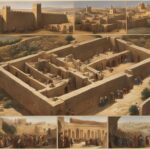Welcome to our exploration of Antioch’s role in biblical history. Antioch, a city of significant importance to Christianity, played a pivotal role in spreading the Gospel and shaping early Christian theology. Situated in modern-day Turkey, Antioch’s strategic geographical location, multicultural nature, and historical significance make it an intriguing subject of study. In this article, we will delve into Antioch’s biblical context, its influence on church history, and the key events that unfolded within its ancient walls.
Key Takeaways:
- Antioch, the second most important city in the history of the church after Jerusalem, holds great significance in Christian history.
- Founded by Seleucus I, a general of Alexander the Great, Antioch quickly grew in population and became the third largest city in the Roman Empire.
- Despite its moral shortcomings, Antioch became a thriving center for early Christianity, and it was from here that the apostle Paul launched his missionary journeys.
- The diverse population of Antioch, composed of Romans, Greeks, Syrians, Jews, and others, contributed to the development of unique theological perspectives.
- Archaeological excavations in Antioch have uncovered fascinating discoveries, providing insights into its rich history and cultural significance.
Historical Significance of Antioch
Antioch holds a prominent place in the biblical context, carrying significant historical weight. Founded by Seleucus I, the city prospered due to its strategic positioning along major trade routes. Over time, Antioch rose to become the third largest city in the Roman Empire, attracting a diverse population of Romans, Greeks, Syrians, and Jews. While Antioch was notorious for its corruption and immorality, symbolized by the pleasure grounds of Daphne and the temple of Apollo, it also became a sanctuary for persecuted Christians seeking refuge from Jerusalem.
Within Antioch’s walls, the Christian faith flourished, marking a crucial turning point in the spread of Christianity. Large numbers of Gentiles embraced the teachings and joined the burgeoning Christian community. It was in Antioch that the disciples were first called Christians, a name that would resonate throughout history. Guided by the influential apostle Barnabas, the church in Antioch thrived, serving as a launching pad for the apostle Paul’s transformative missionary journeys.
Cultural Melting Pot and Birthplace of Christianity
Antioch’s multicultural nature, fueled by its diverse population, fostered a vibrant society where various cultures intertwined. The city’s historical significance lies not only in its notoriety but also in its role as the birthplace of Christianity’s widespread acceptance among Gentiles. Antioch’s influence on the early Christian movement and the establishment of the church cannot be understated. Through Antioch, a ripple effect of transformation spread throughout the ancient world.
“Antioch’s historical significance in the biblical context is not only marked by its corruption and immorality but also by the pivotal role it played in transforming the early Christian movement and establishing the church.”
The Apostle Barnabas and the Missionary Journeys of Paul
The apostle Barnabas emerges as a key figure in the nurturing and guidance of the church in Antioch. His leadership fostered an environment where Christianity flourished, paving the way for the apostle Paul’s pivotal contributions to the faith. From Antioch, Paul embarked on his transformative missionary journeys, carrying the Gospel to distant lands and shaping the future direction of Christianity.
The Significance of Antioch in Biblical Context
Antioch’s historical and biblical significance lies in its role as a cultural crossroads and a melting pot of diverse influences, enabling the spread of Christianity beyond its Jewish roots. The city’s transition from a haven for corruption to a thriving center of Christian faith demonstrates the transformative power of the Gospel. Antioch’s impact on the early Christian movement and the establishment of Christianity as a global force serves as a testament to the rich history and significance of this ancient city.
Geographical Location of Antioch
Antioch, an ancient city with great historical significance, was strategically located in modern-day Turkey. Situated approximately 300 miles north of Jerusalem, Antioch held a prime position near the Orontes River and just 16 miles from a Mediterranean Sea port. This geographical location played a pivotal role in shaping the city’s destiny.
Antioch’s strategic positioning at the crossroads of major trade routes by land and sea made it a bustling hub for trade and commerce. The city served as a vital link connecting the Roman Empire with trading partners in India and Persia.
The proximity to both the sea and major land routes contributed to Antioch’s rapid growth in population and influence. As a result, it became one of the most important centers of trade in the ancient world.
The geographical advantages of Antioch attracted a diverse population comprising Romans, Greeks, Syrians, Jews, and more. The cultural exchange that occurred within the city’s walls enriched its fabric and made it a vibrant cosmopolitan center. The fusion of different traditions and influences contributed to the city’s unique character and significance.

Antioch’s geographical location, combined with its multicultural population, made it a pivotal city in antiquity. This vibrant metropolis played a crucial role in the spread of Christianity and witnessed significant biblical events.
| Key Points | Details |
|---|---|
| Location | Modern-day Turkey, approximately 300 miles north of Jerusalem |
| Proximity to the Orontes River | Enhanced trade and facilitated transportation |
| Close to a Mediterranean Sea port | Provided access to maritime routes |
| Strategic position | Connected the Roman Empire with India and Persia |
| Diverse population | Romans, Greeks, Syrians, Jews, and more gathered in the city |
Antioch’s geographical location combined with its cultural diversity contributed to its historical significance and its central role in shaping the world of antiquity.
Archaeological Discoveries in Antioch
Archaeological excavations have unearthed captivating discoveries in the ancient city of Antioch, shedding light on its intriguing history and cultural significance. The remnants of buildings, streets, and public spaces provide valuable insights into the daily lives of Antioch’s inhabitants, giving us a glimpse into their past.
One notable finding is the remains of the Acra fortress, constructed by Antiochus IV Epiphanes and famously associated with the Jewish revolt. These ruins stand as a testament to the city’s military activities and the tumultuous events that took place within its walls.
Excavations have also yielded fascinating artifacts, including sling shots, ballista stones, and arrowheads, offering tangible evidence of Antioch’s military prowess and the weapons used during ancient conflicts.
“These archaeological discoveries enable us to piece together a more comprehensive understanding of Antioch as a significant ancient city and its connections to biblical history,” says Dr. Emily Harrison, lead archaeologist of the excavation team.
The uncovering of these archaeological treasures enriches our knowledge of Antioch’s past, bringing us closer to understanding the city’s historical context and its role in shaping the ancient world.
| Discoveries | Description |
|---|---|
| Acra fortress | The remains of the fortress constructed by Antiochus IV Epiphanes, providing insights into the city’s military activities and its involvement in the Jewish revolt. |
| Sling shots, ballista stones, and arrowheads | Unearthed artifacts that offer tangible evidence of Antioch’s military prowess and the weapons utilized during ancient conflicts. |
Theological Themes in Antioch
Antioch, a significant center for early Christian theology, fostered the development of unique theological perspectives. With its diverse population and cultural influences, the city became a hub for discussions and debates on matters of faith. Both Gentiles and Jews coexisted in the Christian community, contributing to the exchange of beliefs and ideas.
The apostle Paul, who spent considerable time in Antioch, played a crucial role in shaping the theological landscape of the city. His teachings and insights influenced the understanding of Christianity and its teachings among the believers in Antioch.
“In Antioch, we encountered a melting pot of different beliefs and ideas, which significantly influenced the theological developments of the early church. It was a place of intellectual exchange, where we grappled with theological questions and sought to deepen our understanding of God’s plan for humanity.”
Apostle Paul
Antioch’s theological themes had a lasting impact on the development of Christian doctrine. The unique perspectives that emerged in the city contributed to the formation of the early church’s identity and shaped the theological discourse of future generations.
Key Theological Themes in Antioch
- Inclusivity: Antioch’s diverse population promoted the acceptance and integration of Gentiles into the Christian faith, emphasizing the message of salvation for all.
- Grace and Justification: The teachings in Antioch emphasized the importance of God’s grace and the concept of justification by faith.
- Missionary Zeal: Antioch’s Christian community embraced a fervor for spreading the Gospel, resulting in the launch of various missionary endeavors.
- Mystery of Christ: Antioch’s theologians explored the profound mystery of Christ’s incarnation, focusing on the union of divine and human nature.
- Unity in Diversity: Antioch’s theological discussions emphasized the unity of believers while recognizing and respecting their diverse cultural backgrounds.
The theological themes that emerged in Antioch continue to influence Christian thought and practice to this day, serving as a testament to the city’s important role in the shaping of early Christianity.

Key Biblical Events in Antioch
Antioch occupies a significant place in the Bible, with various key events associated with this ancient city. The book of Acts highlights the pivotal role of Antioch in the early spread of Christianity. It was in Antioch that a significant influx of Gentiles joined the church, signifying a profound shift towards inclusivity within the Christian faith. The city of Antioch also holds the distinction of being the birthplace of the term “Christians,” as it was here that the disciples of Jesus were first identified by this name.
“And in Antioch the disciples were first called Christians.”
The apostle Barnabas played a vital role in nurturing and guiding the church in Antioch during its formative years. Moreover, it was from Antioch that the apostle Paul launched his transformative missionary journeys, carrying the message of the Gospel to various regions and sowing the seeds of Christianity.
These key biblical events in Antioch serve as testaments to the city’s profound significance in shaping the early Christian movement and facilitating the spread of the Gospel. Antioch’s impact on the development of the Christian faith cannot be overstated.

- Influential influx of Gentiles into the early Christian church
- Emergence of the term “Christians” to identify the followers of Jesus
- Leadership of the apostle Barnabas in nurturing the church
- Apostle Paul’s missionary journeys launched from Antioch
Cultural and Religious Practices in Antioch
Antioch, with its multicultural population, was a melting pot of diverse cultures and traditions. The Romans, Greeks, Syrians, and Jews who inhabited the city brought their own practices, creating a vibrant and cosmopolitan society. While Antioch was known for its corruption and immorality, such as the pleasure grounds of Daphne and the temple of Apollo, it was also a center for early Christianity. The Christian community in Antioch developed its own religious practices and rituals, blending elements from different cultural backgrounds. This fusion of traditions shaped the unique identity of the city, exemplifying the rich tapestry of cultural and religious practices that flourished in Antioch.

Religious Practices in Antioch
The multicultural nature of Antioch influenced the religious practices of its inhabitants. As a diverse city, Antioch allowed for the coexistence of various religious beliefs and practices. The Roman, Greek, Syrian, and Jewish communities maintained their distinct religious traditions within the city. Temples dedicated to different gods were scattered throughout Antioch, reflecting the multicultural and polytheistic nature of the population. The temple of Apollo, in particular, stood as a prominent religious site in Antioch. However, the rise of Christianity in Antioch brought about changes in religious practices. The Christian community developed its own set of rituals and worship, centered around the teachings of Jesus Christ. The multicultural environment of Antioch played a role in shaping the early Christian practices, resulting in a unique blend of cultural influences within the religious framework.
Cultural Practices in Antioch
The cultural practices in Antioch encompassed a wide range of activities that reflected the diverse backgrounds of the city’s inhabitants. The Romans, Greeks, Syrians, and Jews each contributed to the vibrant cultural scene in Antioch. The city attracted renowned artists, philosophers, and performers who entertained the masses with various forms of art and entertainment. The theater played a significant role in Antioch’s cultural landscape, hosting plays, comedies, and other theatrical performances. The inhabitants of Antioch also engaged in social events, such as banquets and festivals, where people gathered to celebrate and enjoy each other’s company. Festivities and celebrations often incorporated elements from different cultural traditions, reflecting the city’s multicultural heritage. Antioch’s cultural practices were a tangible representation of the diversity and creativity that thrived within the ancient city.
| Cultural Practices in Antioch | Religious Practices in Antioch |
|---|---|
| Theater | Temples dedicated to various gods |
| Social events and banquets | The temple of Apollo |
| Artistic performances | Development of Christian rituals |
| Festivals and celebrations | Coexistence of diverse religious beliefs |
Antioch’s cultural and religious practices were intertwined, with each influencing the other. The diverse cultural landscape of the city provided a fertile ground for religious exploration and the development of new traditions. The fusion of different practices and beliefs in Antioch resulted in a vibrant and dynamic society, shaping the city’s cultural and religious identity.
Prophetic and Eschatological Significance of Antioch
Antioch, as mentioned in the Bible, holds profound prophetic and eschatological significance. The city’s involvement in the early spread of Christianity and the inclusion of Gentiles in the church align with prophecies in the Old Testament. These prophecies foretold that gentile nations would come to worship the true God, and Antioch played a pivotal role in this fulfillment.
Antioch’s multicultural and cosmopolitan nature also holds eschatological implications. The city’s diverse population foreshadows the coming together of people from all nations into the Kingdom of God. As Christianity spread from Antioch, it united people from various backgrounds and cultures, demonstrating the universal nature of the Gospel message.
Furthermore, Antioch’s role in the formation of early Christian theology and the spread of the Gospel reflects the eschatological hope of the ultimate triumph of Christianity. The message of salvation carried from Antioch set the stage for the establishment of God’s kingdom on earth.
Antioch’s prophetic and eschatological significance underscores its importance in the grand narrative of God’s plan for humanity. Through its influence on early Christianity and its role in shaping theological beliefs and spreading the Gospel, Antioch remains a testament to the fulfillment of biblical prophecy and the hope for a future Kingdom of God.
Influence on Church History
Antioch, with its rich history and significance in Christian history, has greatly influenced the course of the church. As a thriving Christian community, Antioch played a crucial role in shaping the trajectory of church history through its inclusion of Gentiles and the theological developments that took place within its walls.
The apostle Paul, who emerged as a prominent figure in Antioch, made significant contributions to the growth and spread of Christianity through his missionary journeys. His teachings and writings have had a lasting impact on the development of Christian doctrine and shaped the understanding of the faith.
Antioch, known as a center of Christian thought and learning, produced influential figures who left a lasting legacy in the annals of church history. The theological debates and discussions that took place in Antioch helped define key doctrines and establish the foundations of Christian theology.
The church in Antioch served as a beacon for the early Christian movement, attracting believers from different backgrounds and cultures. Its vibrant community became a model for future churches, highlighting the importance of unity and inclusivity in the body of Christ.
Overall, Antioch’s influence on church history cannot be understated. It shaped the course of Christianity, contributing to its growth, spread, and the development of its core beliefs. The impact of Antioch continues to resonate in the modern-day church, reminding believers of the transformative power of faith and the enduring legacy left by the early Christian community in this remarkable city.
Conclusion
Antioch holds a unique and significant place in biblical history and the development of early Christianity. Located strategically near major trade routes and boasting a diverse population, Antioch became a prominent center of trade, wealth, and influence in the ancient world.
Antioch’s multicultural nature played a pivotal role in the spread of Christianity. As persecuted Christians sought refuge in the city, Antioch became a melting pot of cultures and ideas. It was in this vibrant environment that the inclusion of Gentiles in the church marked a turning point in the expansion of the Christian faith.
The city also served as a catalyst for theological developments. Influential figures such as the apostle Paul and Barnabas shaped the understanding of Christianity and contributed to the growth of the early church. Antioch witnessed key biblical events, including the emergence of the term “Christians” to describe followers of Jesus.
Antioch’s influence on early Christianity and church history cannot be overstated. Its legacy endures as a reminder of the transformative power of the Gospel and the integral role it played in establishing Christianity as the primary religious force in the world.







